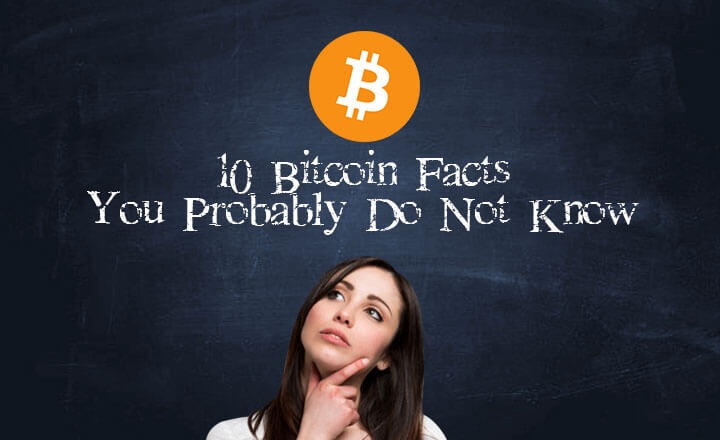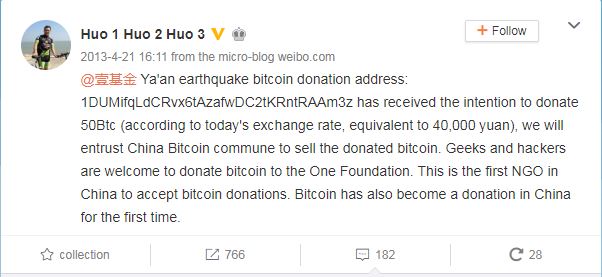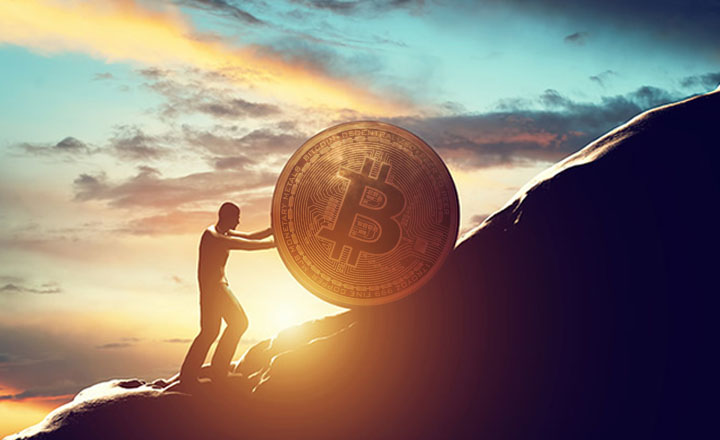10 Interesting Bitcoin Facts Most People in Crypto Industry Do Not Know

It has been 10 years since Bitcoin was introduced as a digital asset that would provide fast peer-to-peer decentralized transactions worldwide. The objective of this crypto coin, as well as its promising features, made it so popular that there are now countries using Bitcoin as an official currency.
Its popularity made Bitcoin a headline of tons of news articles in different parts of the world. Despite the huge buzz that the currency has created, there are still some interesting facts about this crypto coin that are not known to most. Here are 10 lesser-known facts about Bitcoin that may leave anyone uttering, “Really?”:
1| May 22 Is Bitcoin Pizza Day
May 22 became memorable after Laszlo Hanyecz paid 10,000 BTC for two Papa John’s pizzas in 2010. This all started when he wrote on a Bitcoin Talk forum thread:
“I’ll pay 10,000 bitcoins for a couple of pizzas.. like maybe 2 large ones so I have some left over for the next day. I like having left over pizza to nibble on later. You can make the pizza yourself and bring it to my house or order it for me from a delivery place, but what I’m aiming for is getting food delivered in exchange for bitcoins where I don’t have to order or prepare it myself, kind of like ordering a ‘breakfast platter’ at a hotel or something, they just bring you something to eat and you’re happy!”
Someone took the offer of Hanyecz. The next thing he knew, two boxes of pizza were already on their way to his house, and his 10,000 BTC was already transferred to the man who purchased pizza for Hanyecz.
Those boxes of pizza were considered as the first products bought using Bitcoin. If the price of Bitcoin today were the price of Bitcoin that time when Hanyecz made the transaction, those pizzas he ordered would be the most expensive in history. Hanyecz may be regretting he ever spent his bitcoins on pizza, but he probably is happy he became the father of Bitcoin Pizza Day.
2| Cleaning Made a Bitcoin Miner Lose His 7,500 BTC
Bitcoin miner and IT James Howells misplaced 7,500 BTC in 2013. He said in an interview with The Telegraph:
“After I had stopped mining, the laptop I had used was broken into parts and sold on eBay.”
But that was not how he lost his bitcoins. He was smart enough to use a hardware wallet to store his private keys. But one day while he was cleaning his house, he accidentally threw the drive which he thinks now lies somewhere in a landfill in Newport, South Wales.
James still wanted to find the drive despite knowing that four years’-worth of garbage was there. The only one forbidding him and his drive from meeting again was the Newport City Council. The council spokesperson said that the reason James was not allowed to dig up garbage was that the digging might have an environmental impact. The spokesperson also added:
“It is likely that the hardware would have suffered significant galvanic corrosion due to the presence of landfill leachates and gases.”
The city council believed that even if James did find his drive, it would be damaged because of the toxic waste from the dump. The search for the lost bitcoins would also require construction vehicles that are worth millions.
3| A University Accepts Tuition Fees in BTC
The University of Nicosia, also known as UNic, is the first accredited university that accepts BTC as payment for tuition fees and other expenses.
Dr. Christos Vlachos, UNic Chief Financial Officer, said:
“We are acutely aware that digital currency is an inevitable technical development that will lead to significant innovation in online commerce, financial systems, international payments and remittances, and global economic development.”
The idea came from the request of students. After careful research, the administration found out that by accepting Bitcoin payments, they would be providing a convenient and cheaper option for students. The university spokesperson said:
“The intention of this initiative is to ease transmission difficulties for certain students and to build our own practical knowledge about this field, not to engage in currency speculation.”
The university then started offering an online course named “Introduction to Digital Currencies.” This course aims to give students a better understanding of the Bitcoin sphere. Following this, the school now conducts an annual blockchain event called Decentralized.
On October 26, 2018, @Uni_of_Nicosia tweeted:
“?EVENT | #DECENTRALIZED 2018: Europe’s Premier #Blockchain Summit Returns! Registration continues for the pioneering Blockchain conference that will feature 70+ speakers, 20 exhibitors and close to 1,000 attendees.
?14-16 November ?#Athens
?http://www.decentralized.com
#ThinkBig”
?EVENT | #DECENTRALIZED 2018: Europe’s Premier #Blockchain Summit Returns! Registration continues for the pioneering Blockchain conference that will feature 70+ speakers, 20 exhibitors and close to 1,000 attendees.
?14-16 November ?#Athens
?https://t.co/3LnwKNEZZm#ThinkBig pic.twitter.com/JSOkxqEwT1— University Nicosia (@Uni_of_Nicosia) October 26, 2018
4| A Well-Known Space Flight Venture Accepts BTC As Payment
Virgin Galactic is a spaceflight company that offers suborbital spaceflights and launches for science missions. The company is run by Richard Branson, a billionaire entrepreneur. On November 22, 2013, Richard posted in his official Twitter account that Virgin Galactic is now accepting Bitcoin.
“Want to spend your #bitcoins? How about a ticket to space! Will discuss today live on @SquawkCNBC @virgingalactic”
Want to spend your #bitcoins? How about a ticket to space! Will discuss today live on @SquawkCNBC @virgingalactic
— Richard Branson (@richardbranson) November 22, 2013
He also posted a comparison between fiat currencies and Bitcoin on Virgin Galactic’s website. He said:
“Virgin Galactic is a bold entrepreneurial technology. It’s driving a revolution. And Bitcoin is doing just the same when it comes to inventing a new currency. I think the fact that there’s going to be a limited number of Bitcoins out there and it will ultimately be capped — unlike normal currencies where governments can print more currency — gives it a sense of security. There have been spikes and lows. But I think one day it will settle at a price that, I personally believe, is higher than the price today.”
5| Korea and China Banned Bitcoin
The Republic of Korea decided to ban the use of Bitcoin. But this was followed by 200,000 petition signatures and angry comments thrown at the President. The debate became so intense that in the end, the government announced the lifting of the ban.
Another country that decided to ban Bitcoin was China. The country went great lengths just to achieve its goal of closing down exchanges and preventing overseas transactions. But such move did not take away the locals’ access to their own digital assets.
Donald Zhao, Bitcoin trader, said:
“It is common for people to use VPNs [virtual private networks] to trade cryptocurrencies, as many exchange platforms relocated to Japan or Singapore.”
The supposedly closed exchanges are said to have moved to Hong Kong. From being known as OKCoin, Huobi, and BTCC China, these exchanges are now known as OKEx, Huobi Pro, and BTCC in Hong Kong. A number of Chinese Bitcoin investors switched their bank accounts from China to Hong Kong as well.
6| FBI Has One of the World’s Biggest Bitcoin Wallets
In 2013, the FBI shut down an online drug market place called Silk Road that was said to be holding 26,000 bitcoins. Meanwhile, the owner of the site, Ross Ulbricht, was thought to be keeping 600,000 bitcoins.
The FBI was able to seize Ulbricht and his belongings – but not his bitcoins because Ulbricht’s keys were needed to gain access to the hundred-thousand worth of crypto coins.
Jerry Brito, George Mason University Technology Police Program Director, explained:
“Basically they would have to get the private keys to the suspect’s Bitcoin addresses. (Think of it essentially like getting the password to an account.) They could either get that with his cooperation or if he had stored it somewhere now accessible to the authorities. Once they have the private keys, they would be able to transfer the Bitcoins and I imagine that they would transfer them to a Bitcoin address that only they control.”
With all the bitcoins that the FBI confiscated from Silk Road and possibly from Ulbricht, FBI has become a holder of one of world’s largest Bitcoin wallets.
7| Jet Li’s One Foundation Was the First Charity to Accept Bitcoin Donations
Jet Li created One Foundation in 2007. The charity operates under Red Cross Society of China with a partnership with Chinese Red Cross. The organization aims to support NGOs. In 2013, the group started accepting Bitcoin donations. On Weibo, the foundation posted:
“@壹基金 Ya’an earthquake bitcoin donation address: 1DUMifqLdCRvx6tAzafwDC2tKRntRAAm3z has received the intention to donate 50Btc (according to today’s exchange rate, equivalent to 40,000 yuan), we will entrust China Bitcoin commune to sell the donated bitcoin. Geeks and hackers are welcome to donate bitcoin to the One Foundation. This is the first NGO in China to accept bitcoin donations. Bitcoin has also become a donation in China for the first time.”

After two days, One Foundation was able to accumulate 230 BTC. The proceeds were used for the rehabilitation of the victims of the earthquake in Lushan, Sichuan in China.
8| There is an Ongoing Move to Turn Puerto Rico into a “Crypto Utopia”
Puerto Rico suffered great devastation brought about by Hurricane Maria in 2017. One-third of the population died with a low estimation of 4,645 victims. But even if Puerto Rico has become a “ghost island,” billionaire Brock Pierce believed that there was a chance to revive the country. He said:
“Puerto Rico has the possibility now to be put on the map as a hub of innovation. And the pleasure of bringing essentially the most innovative industry the world has ever seen to a place that normally wouldn’t have been a hub, that’s a wonderful thing if it works.”
Pierce is a co-founder of block.one and director of the Bitcoin Foundation. He also owns around £5 billion-worth of EOS. He and his team plan to take over museums and hotels in Puerto Rico.
More billionaires joined the team of forming Puerto Rico into what they call a “crypto utopia.” Some of the locals are welcome to the idea, but there are still a few who are worried about what the upcoming crypto land will bring. Add to this the fact that the electricity in Puerto Rico is inconsistent.
9| More Than 1,500 Bitcoin Alternatives Exist
Although Bitcoin is the most popular cryptocurrency online, the crypto coin still has its flaws. Knowing this, developers have decided to create Bitcoin alternatives called “altcoins.” Since these coins are alternatives to Bitcoin, they use blockchain technology as well. The main difference is that the altcoins are created mainly to solve the problems users can experience with Bitcoin.
Some of the popular altcoins are Litecoin, Ripple, and Ethereum. As of this writing, there are more than 1,500 Bitcoin alternatives available. Despite the huge number of altcoins, most users still prefer to buy Bitcoin. A possible reason for this is that users still believe that the crypto coin’s price can rise again up to US$20,000.
10| Roughly 80% of the Supposed Total Bitcoins to Be Released Have Been Mined
Bitcoin was created to release only 21 million coins. In January 2018, already 16.8 million BTC were mined, equivalent to 80% of the total number of coins. This led speculations that the final coin will be mined in 2140.
Jamie Redman, Bitcoin.com reporter, said:
“Unlike your MP3s or digital movies, bitcoins cannot be copied, and this weekend 16.8 million of them have been mined, hoarded and a large number of them have been lost. To many cryptocurrency investors, this makes Satoshi’s invention a very valuable digital asset, unlike anything the world has ever seen.”
Although mining Bitcoin will soon be over, users and investors still believe that the coin will still be in business after that. CommerceBlock CEO Nicholas Gregory said:
“I’m not sure of an exact date, but essentially when the cap comes to an end it should be the transaction fees that will still keep the miners from mining and at the moment the fees are quite high anyway.”
Marking its first decade since launch, Bitcoin has undoubtedly become more widely known across the world. All throughout its existence, the coin created impacts. There is still much to share about this cryptocurrency, but the above list rounds up some of the most notable moments that Bitcoin got largely involved in.






